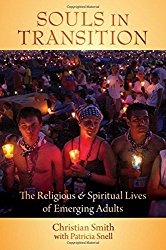I recently wrote about a conversation with a millennial, and his explanation of what this expression means.
 If you are new to this expression, and would like to do a little reading, here is a resource from Patricia Snell Herzog who is Assistant Professor in the Department of Sociology and Criminal Justice at the University of Arkansas in Fayetteville, Arkansas. She is a contributing author of Souls in Transition and Lost in Transition: The Dark Side of Emerging Adulthood.
If you are new to this expression, and would like to do a little reading, here is a resource from Patricia Snell Herzog who is Assistant Professor in the Department of Sociology and Criminal Justice at the University of Arkansas in Fayetteville, Arkansas. She is a contributing author of Souls in Transition and Lost in Transition: The Dark Side of Emerging Adulthood.
Here are some highlights of the article.
- RAAS (religious and also spiritual), RBNS (religious but not spiritual), SBNR (spiritual but not religious), and NRNS (not religious, not spiritual). The answer is that there are emerging adults in each of these four types, such that some emerging adults are SBNR and others are not.
- Most spiritual-but-not-religious (SBnr) emerging adults believe in a higher power. Many attended religious services at one point in time, but have either lost interest in them or become antithetical to the religious approaches to which they were exposed.
Understanding the different types of “Spiritual, but not Religious” is crucial because in order to approach an emerging adult with the gospel, you need to understand how think, and what exactly they believe. If you are looking for a good read, check out Generation Ex-Christian: Why Young Christians are Leaving the Faith and How to Bring them Back by Drew Dyck.
If you are looking to teach/share the concept of “Spiritual, but not religious” with a group, here is a lesson plan by the Institute for Faith and Learning.
 Dr. G. David Boyd is the Director of EA Resources, a nonprofit designed to equip churches and parents to minister to the needs of emerging adults.
Dr. G. David Boyd is the Director of EA Resources, a nonprofit designed to equip churches and parents to minister to the needs of emerging adults.





